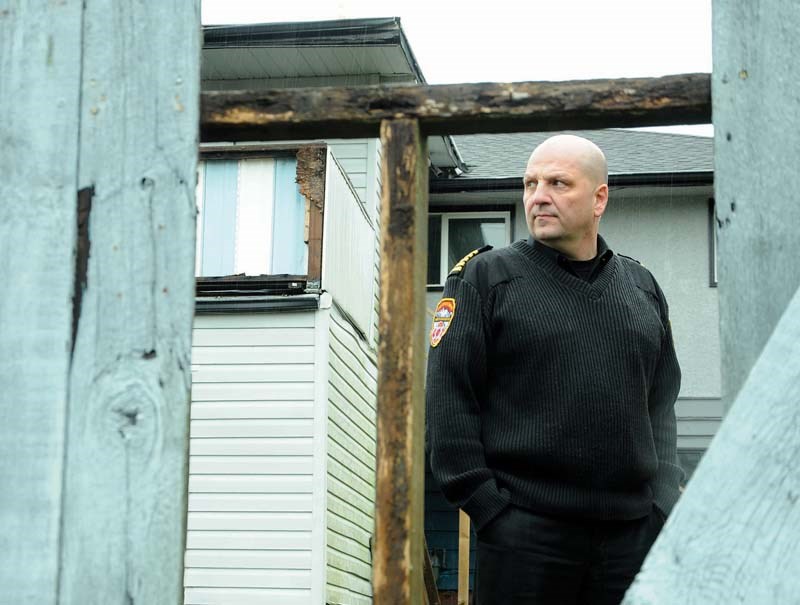The City of North Vancouver is looking to contend with some new challenges in Moodyville as the neighbourhood gradually empties out of old residents to make way for new development.
North Vancouver City Fire Department members were called to put out a fire burning in a vacated home on Monday afternoon. A letter carrier spotted smoke coming from a home on the 500 block of East Second Street and called 911.
“It appears the back door was open. There was a squatter. Somebody had gone into the house and lit a minor fire there, probably to keep themselves warm,” said fire Chief Dan Pistilli.
It’s the third such fire at a vacated home in Moodyville since November. Following the fires late last year, Pistilli pushed for the developers to hire security guards, who now patrol the site but more will likely have to be done as redevelopment in the area is just beginning.
The entire neighbourhood, which was one of the first colonial settlements on the North Shore, has been in transition following the Port of Vancouver’s Low Level Road project and expansion of the waterfront grain terminals. The city opted to redraw the area in the official community plan to allow for medium density condominiums and townhouses, and developers have been assembling properties for rezoning.
The largest assembly, by Seacliff Properties, brought together 52 of the 60 properties south of Second Street east of St. Davids Avenue to be rebuilt as 340 units of stacked townhouses.
Dozens of other homes on both sides of Third Street are awaiting redevelopment for other medium density residential projects.
“They might have to start securing them one by one as they’re vacated. That’s what we’re dealing with right now,” Pistilli said.
More than an area of concern for firefighters, Moodyville is also providing new challenges for the North Vancouver RCMP, according to spokesman Cpl. Richard De Jong
“We’re certainly aware of the increase of homeless people to be inhabiting these places. Technically, they are trespassing. Technically they would be considered breaking and entering,” De Jong said, although, he added, it’s very unlikely those types of charges would be pursued. “Strategically, it’s on our radar. We have, no pun intended, hot spots, and we would categorize that area as a hot spot just to be on the lookout for. Our members would do an extra patrol at night just to see if there are any lights or anything in buildings that shouldn’t be there.”
Residents in a neighbourhood that was once known for its affordable Second World War-era homes are also noticing the less tangible effects of its hollowing out. Once such resident is city Coun. Rod Clark.
“Yes, it’s feeling a little bit unfriendly down there,” said Clark, who has lived on East Second Street since before the Port of Vancouver’s Low Level Road project. “It’s got a very vacant kind of a feel. It’s not a good feel. ... It had a very neighbourly sort of feel to it for a lot of years.”
Clark said he’s concerned by the fires and he also receives word from his remaining constituents below Third Street about vagrancy. And it seems, as two-legged inhabitants move out, four-legged ones are moving in.
“The rodent population has gone up significantly, to my direct knowledge. I saw a pretty nasty looking wharf rat coming up the steps as I was leaving one morning,” he said.
The city has written to all of the developers who own land assemblies in Moodyville, informing them that properties shouldn’t be left abandoned for more than 60 days, according to Gary Penway, the city’s director of community development.
“We’ve been pushing people to either keep them occupied, secure them, or get on with demolition of them. And we were pushing some people to the point we were close to issuing tickets but they got active with their demolition process,” he said, noting some former homes have already been levelled on the north side of Third Street and more demolition permits are on the way for projects on the south side.
But demolition is more complicated now than it used to be, now requiring a hazardous materials report and the removal of any contamination before the city can issue the demolition permit, Penway added.
Of the 52 properties assembled by Seacliff, 18 are now vacant, Penway said. While the property has been rezoned, the developer hasn’t filed for building permits, meaning the buildings will likely still be empty until the end of the year.
“We’re going to be meeting with them. They’re going to increase the security for those properties and we’ll be pushing them to either get on with reoccupying the buildings or get on with demolition,” Penway said.
Meanwhile, Clark, who lives in a home not up for redevelopment, said he’s hanging on.
“I’m living in hope that the type of redevelopment, which has been mandated by council is actually going to be nice and livable. However, I have great concerns,” he said. “My whole thing is I’m looking for a better day in Moodyville. I’ve been there for a while and we’ve gone through this long process. Let’s make the better day happen sooner rather than later.”
A spokesperson for the North Shore Lookout Emergency Aid Society, which employs homeless outreach workers, was not available for comment.



